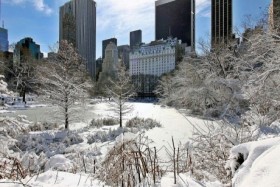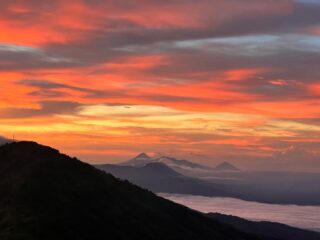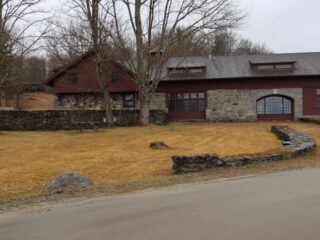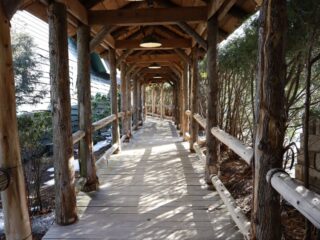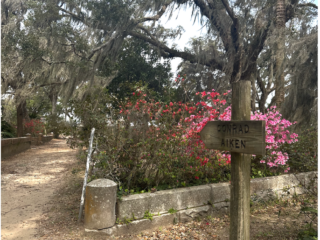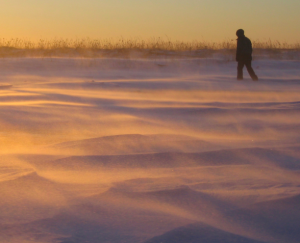
by Melissa Mapes
The afternoon sun, bright but ephemeral, reflected off the snow, giving the expanse of Cook Inlet and the city of Anchorage a luminous glow. I leaned forward in my plastic sled, bracing myself against the bite of the frozen air as I rushed down Oceanview Hill. I envisioned myself flying. I was on a broom, like Harry Potter diving for the snitch in a game of Quidditch. Zoom to the left! Zoom to the right! Dodge a bludger! (Or, in my case, a tree.)
I was 16, but younger at heart, and sledding was the only winter sport I enjoyed. Had reading been considered a sport, though, I would’ve made varsity. I blazed through books, slaughtered short stories, and mauled magazines. I may have been unable to ski moguls or skate figure eights, but my page count dwarfed the goals, points, and miles-per-hour of my peers. Harry Potter by far comprised the largest portion of those pages. I read those books relentlessly, and his story had long since merged with my adolescent identity, like a parallel universe of magic that I could enter at will. Often I searched for similarities between the two–hints that Harry’s world could exist, even if it didn’t.
My sled slid to a halt perilously close to an enormous, hoofed creature. It may easily have been a centaur or hippogriff, but the antlers indicated a moose. I stared up at the beast from my sitting position in the snow. The air between us was still. He stared back in casual appraisal–clearly unfazed. I noticed that his large black eyes were lined in frosted lashes like my own. After a few moments, he flicked his ears, uprooted his hooves, and walked away. I ran back up the hill at maximum speed. When I reached the top, my friend, Jane, handed me a thermos of spiked hot chocolate. I took a large swig of cocoa slightly laced with coffee liquor.
“You okay” Jane asked. Her pale face peeked out of a round opening among her layers of vibrant clothing, like a Technicolor Eskimo. “I saw the moose come out of the trees when you were already half-way down.”
“I’m here, aren’t I?” I replied.
She shrugged and said, “You have snow all over your face.”
My cheeks were so numb I couldn’t tell.
Jane and I had become friends over fanatical Harry Potter discussions in the backseat of her mother’s suburban on the way to soccer practice in 6th grade. She was an excellent player and I was terrible, but we had Harry in common. If not for that, our friendship may never have blossomed. We were both rather shy.
The arc of Oceanview Hill sloped sharply to sea level and extended all the way to the frozen grey inlet. Only a smattering of gnarled evergreens intervened between land and water. The sun was setting in a sigh of crimson and my mood sank along with it. It was like watching a loved one turn their back to you. The creeping dusk carried thoughts of recent events that I had been forcing from my mind. A string of deaths had occurred at school–cancer, suicides, and murders–like a horrible little apocalypse in our dark wedge of the world. The crying in the hallways stifled even the idea of a smile, so Jane and I had left on a truant sledding trip. We needed a dose of joy. Otherwise, we would’ve had to watch the sun rise and set through the window of a classroom heavy with tragedy.
Along with mourning lost lives, I felt mourning for my disappearing childhood–smothered by harsh, adult realities. I wished more than ever that I could escape to Harry’s magical dimension.
My childhood in Alaska felt both special and lonely. As a place to grow up, Anchorage is an especially jarring mixture between the mainstays of American culture and the majesty of the Alaskan frontier. It was like living in the grand kingdom of a proud and merciless king. The land, of course, ruled. The mountains were his fortress–a mass of unconquerable blue walls–and the bears and wolves his henchmen. One misstep, one false calculation of his strength, and your life in this world could disappear in an avalanche of snow.
At the king’s feet, lay fast food joints, malls, and movie theaters with thousands of people milling about, like anywhere else in America. This unharmonious union is the product of the people of Anchorage, who are often outsiders, reaching for normalcy amidst the utter seclusion that Alaska so abundantly supplies. The isolation made me enormously restless, thus, when I began a book about a boy who lived in a cupboard under the stairs at the age of 12, I felt an instant kinship with him. I too was trapped, but in a different way.
On a cold winter night, as I burrowed into my bed by the frosty window, I could taste the warm butter beer that Harry and his friends drank. Like a hot caramel cider. As Harry trudged through the Forbidden Forest, I smelled the earthy moss and tangy pollen. I could hear the rustling of Bowtruckles in the trees.
Harry’s story transplanted me into a world of magic and color when I was trapped in mostly monochrome–white snow against black sky and grey ice. The beauty of winter was never lost on me, but neither was its harshness. The smooth, sparkling blanket of snow, the skeletal tree branches coated in white, and the glimmering constellations in the unpolluted sky could not overcome the incessant darkness. Depression rode the tailcoats of winter, spreading melancholy like a band of loose Dementors, and the saving grace of summer never arrived with due haste. Were it not for Harry, the tiresome post-holiday months would have been unbearable for me.
I secretly waited until high school for an owl to come with an acceptance letter to Hogwarts. By then I had matured to the point where I could no longer allow myself to believe in such childish joys. I always knew that I was choosing to believe in Harry’s world, to make it as real as it felt, and I occasionally wonder if other cherished memories are fantasy as well. For example, when I was about nine, in the full green glory of an Alaskan summer, my father took my sisters and me to Beluga Point. It’s nothing more than two outcroppings of rocks that jut up side-by-side from the edge of the ocean by Seward Highway. But, at the time, its name rang true, for the Captain Cook Beluga whales were frequently sighted swimming around the point.
Today, Captain Cook Belugas are an endangered species and are scarcely seen, but on that day, we were in luck. A pod of white whales were loitering in the surrounding waters. We climbed the cliff-like formation and watched the graceful bodies duck and roll below us as they came up for air. Steep mountains traced the curve of the water to a shore far off in the distance, like the jagged molars of an immense jaw. I wondered what magic had sparked our profoundly beautiful world. While sitting atop the point, mesmerized by the movement of the whales below, I felt the sudden, irrepressible urge to touch one.
I waited for my father to become distracted, then lowered myself into the crevasse between the rocky mounds and crawled to a low-hanging ledge. The Belugas were only feet away. The tide was high and the water was deep enough that they could approach the point. Their snorting blowholes were as loud as my own excited gasps. Gleaming eyes examined me as the whales breached, as if they found me as strange and fascinating as I found them. One emerged just below me, her curiosity piqued by my presence, and I reached out for her. She wasn’t at all like the porpoises at Sea World, which have been trained to cackle and dance upon human whim. Her white form evoked the spirit-like Patronus creatures that frighten off Dementors in Harry’s world.
The whale took a lingering sidelong glance at me as she glided over the water, like a lap swimmer surfacing for air. When she ducked back into the sea, the peak of her back brushed against my outstretched fingertips, and my heart erupted with joy at the electrifying contact. I felt wild and alive, like we shared a prehistoric connection through our mutual existence. I hastily withdrew my shaking hand and scrambled out of the ravine, desperate to share my story.
“Dad! Dad!” I cried. “I touched a whale!”
“Cool,” he said, thinking it another of my inventions.
When in the Alaskan frontier, my father stands taller, prouder, and seems to absorb the grandeur around him like a knight in King Alaska’s circle or, perhaps, an Auror.
The complacent and doubting responses of my family when I told them my whale story greatly disappointed me. And, possibly, their doubt is the reason why I too wonder at the veracity of the memory. It seems almost too incredible to have happened. But, I choose to believe it, because her slick, porcelain skin felt very real, and because the thought elicits an echo of the thrill I felt. If the cold and dark are the earthly incarnations of Dementors, then my Patronus is undoubtedly a whale, who gave me a moment that could brighten even the darkest of times.
Shortly before I left Alaska for good at the age of 18, I drove alone to Beluga Point. It was a sublime July day and the sun shone tirelessly in the pale blue sky. The tide was out, so I climbed down to the shore, removed my shoes, and folded my jeans up to my knees. I waded into the cold water and thought about all I was leaving. A goodbye forever to both Alaska and childhood. Sure, I would visit, but it would never again be home, and the same sentiment was true for my adolescence. I remembered the people at my school who had taken their own lives, and wished dearly that they too could have touched a whale and found joy enough to sustain them.
One of the hardest parts of this goodbye was letting go of Harry–the stubborn, courageous, and adventuresome boy who I followed on his fantastical journey. Harry, who lost his parents. Harry, who lost his friends too.
His pain was so much greater than I could fathom, but he continued on, propelled by Ms. Rowling’s imagination. And I continue on with Harry in mind, as I now live in sunny Portugal, a country J.K. Rowling inhabited as well. I’m convinced it is fate.


